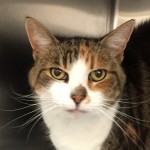News
Pet of the Month – July 2105
by admin on July 31st, 2015
Category: Pet of the Month, Tags:
Poppy is a lovely cat who suffers from the colon disorder called idiopathic (meaning the cause is unknown) megacolon. Constipation (infrequent or difficult defecation) is fairly common in cats. If it occurs only occasionally there’s usually not much to worry about. However, in some cats, constipation begins to occur more and more frequently, ultimately leading to obstipation: constipation that can’t be controlled by medical means. There are many potential causes of obstipation, but over half result from idiopathic megacolon.
As the name implies, the cause of idiopathic megacolon is unknown, but cats with mild or moderate forms (or perhaps those with early stages of the disease) often benefit from increased dietary fiber, administration of laxatives or stool softeners of various kinds, and drugs called prokinetic agents (like cisapride) that stimulate the muscles of the colon. As things progress, the occasional enema performed at a veterinary hospital may be necessary. Unfortunately, the need for enemas or other methods of removing feces from the colon becomes more and more frequent; ultimately, cats with advanced stages of the disease may simply stop responding to any medical therapy and the colon becomes little more than a big, flaccid bag containing a mass of hard feces.
Subtotal colectomy – surgically removing the major portion of the colon – is at that point really the only remaining option. This is major surgery, but the overwhelming majority of cats respond quite favourably. The most common postsurgical problem is diarrhea, but most cats begin to form stool of an acceptable quality within several weeks or less. Life returns to normal, or near normal, within several weeks. Though a subtotal colectomy is not necessarily a perfect solution, the majority of people whose cats have had one are quite pleased with the results. They continue to share life with a cat friend who, without the surgery, would not have survived.
We are very pleased to report that Poppy has been coping very well with more conservative treatments including laxatives, prokinetic agents and the occasional enema.
Responses are currently closed, but you can trackback from your own site.

